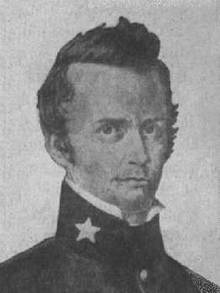|
| ||||||
|
| |||||||
|
| |||||||
|
Texana:
Texas Book Reviews Reviews of Texas General, Texana, Texas wine books and Guides Cookbook Reviews All our reviews of cookbooks News Stories Stories on major events, people and culture Notable Native Texans The famous and infamous born in Texas Texas Sports Store Clothing for UT, Texas A&M and Texas Tech
Free Newsletter
Register to receive our free monthly Texana newsletter Message Boards Ask questions, discussions
Visit & Bookmark:
Texas Cooking www.texascooking.com Recipes, food articles, barbecue, chili, desserts |
 William Barret Travis Letters from the Alamo
by Lori Grossman The Alamo's acting commander, Lieutenant Colonel William Barret Travis, fought Mexican forces not only with conventional weapons, but also with the ammunition of the written word. Throughout the 13-day siege, he wrote reports, drafted urgent appeals for aid and, in the last days, composed emotionally moving notes to his closest friends. Travis had left much unfinished business behind when he left Alabama in 1831 to come to Texas. In debt, Travis decided to start afresh. He promised his young wife, Rosanna, that once he was back on his feet, he would send for her and their two children. Travis never returned, and in January 1836, Rosanna divorced him. Walter Lord's 1961 book, A Time To Stand (considered a definitive account of the Alamo), described Travis in various ways: "touchy. . . sensitive. . . dramatic. . . moody. . . temperamental." Not a flattering portrait. Yet, Travis would exhibit bravery and eloquence under pressure. On the second day of the Alamo siege, Travis knew his garrison was in desperate need of reinforcements. He composed this stirring appeal which has been called "the most heroic document in American history." Commendancy of The Alamo Copies of this impassioned plea spread through the countryside causing alarm, but bringing only limited assistance. A contingent of 32 men from Gonzales did come to the Alamo's aid, arriving in the early morning hours of March 1. There must have been a sense of great jubilation and relief among Travis and his men. Maybe the hoped-for reinforcements finally were on the way. Perhaps Travis' moving call to arms had struck at the hearts of fellow Texians who also were heading for San Antonio at that very moment! Sadly, their hopes were dashed. With every passing day, Mexican General Antonio Lopez de Santa Anna's forces increased in number and entrenched themselves all around the crumbling old mission. Help never arrived. No matter - the defenders of the Alamo were determined to stand their ground. Late in the evening of March 3, a messenger, John W. Smith, prepared to leave on a mission to secure help for the embattled garrison. Some of the men gave Smith notes to forward to their families - just in case. Travis finished a report to the president of the convention being held at Washington-on-the-Brazos - east of San Antonio - to discuss Texas' independence from Mexico. Next, the Alamo commander wrote a letter to his friend, Jesse Grimes, explaining why he had chosen to make his stand in the Alamo:
Let the Convention go on and make a declaration of independence, and we will then understand, and the world will understand, what we are fighting for. If independence is not declared, I shall lay down my arms, and so will the men under my command. But under the flag of independence, we are ready to peril our lives a hundred times a day . . . Travis' deep commitment to Texas liberty left him little time to tend to young Charles, so he arranged for his son to board with a friend, David Ayres, at Montville, the Ayres family home near Washington-on-the-Brazos. The last note Travis wrote from the Alamo concerned his dearly-loved little boy. Hurriedly scribbled on a dirty scrap of wrapping paper, it read:
Take care of my little boy. If the country should be saved, I may make him a splendid fortune; but if the country should be lost and I should perish, he will have nothing but the proud recollection that he is the son of a man who died for his country.
Related Books:
Only 27-years-old when he died during the final battle in the pre-dawn hours of March 6, 1836, Travis and the rest of his garrison likely met their fate not knowing that the longed-for Declaration of Texas Independence was drafted and signed on March 2. In any case, their noble efforts gave General Sam Houston time to raise an army. On April 21, Houston's forces ambushed and routed Santa Anna's soldiers at San Jacinto. "Remember The Alamo!" was one of the rousing battle cries.
Almost two months earlier (February 25, 1836), Travis had written a chillingly prescient letter to General Houston, expressing his belief that he and his men faced a major assault:
"If they overpower us, we fall a sacrifice at the shrine of our country, and we hope posterity and our country will do our memory justice . . ." The Revolution was over. Through their sacrifice, the Alamo defenders had helped make the dream a reality. The Republic of Texas was born and, as Travis predicted, those who died at the Alamo would never be forgotten. For more about Travis and the Alamo, read A Time To Stand by Walter Lord and Three Roads To The Alamo by William C. Davis.
Lori Grossman lives in Plano, TX
|
|